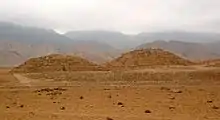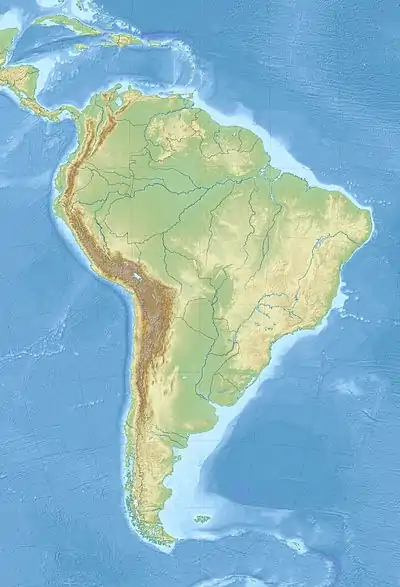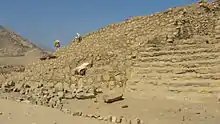Caral
Caral, or Caral-Chupacigarro,[1] was a large settlement in the Supe Valley, near Supe, Barranca Province, Peru, some 200 kilometres (120 mi) north of Lima. Caral is the most ancient city of the Americas and a well-studied site of the Norte Chico civilization.
 Remains of Caral | |
 Shown within Peru  Caral (South America) | |
| Alternative name | Caral-Supe |
|---|---|
| Location | Lima Region, Peru |
| Coordinates | 10°53′37″S 77°31′13″W |
| Type | Settlement |
| History | |
| Founded | c. 2600 BC |
| Abandoned | c. 2000 BC |
| Cultures | Norte Chico |
| Site notes | |
| Condition | In ruins |
| Official name | Sacred City of Caral-Supe |
| Location | Supe District, Barranca Province, Peru |
| Criteria | Cultural: (ii), (iii), (iv) |
| Reference | 1269 |
| Inscription | 2009 (33rd session) |
| Area | 626.36 ha (2.4184 sq mi) |
| Buffer zone | 14,620.31 ha (56.4493 sq mi) |
| Website | www |
The city was declared a UNESCO World Heritage Site in 2009. In early 2021, tensions arose between squatters claiming land rights and archaeologists researching the site as housing construction encroached on the site.
History
Caral was inhabited between approximately 26th century BC and 20th century BC,[2] and the site includes an area of more than 60 hectares (150 acres).[3] Caral has been described by its excavators as the oldest urban centre in the Americas, a claim that was later challenged as other ancient sites were found nearby, such as Bandurria, Peru. Accommodating more than 3,000 inhabitants, it is the best studied and one of the largest Norte Chico sites known.
The city was declared a UNESCO World Heritage Site in 2009.[4] In early 2021 during the COVID-19 pandemic, tensions arose between squatters claiming land rights and archaeologists researching the site as housing construction encroached on the site.[5][6]
 The Caral temples in the arid Supe Valley, some 20 km from the Pacific coast.
The Caral temples in the arid Supe Valley, some 20 km from the Pacific coast.
Archaeological findings
Paul Kosok discovered Caral in 1948. The site received little attention at the time because it appeared to lack many of the typical artifacts that were sought at archaeological sites throughout the Andes.
In 1975, the Peruvian architect Carlos Williams made a detailed record of most of the archaeological sites of the valley of Supe, among which he recorded Caral. Based on what he observed in the region, he made some observations about the development of architecture in the Andes.
Ruth Shady further explored this 4,000- to 4,600-year-old city in the Peruvian desert, with its elaborate complex of temples, an amphitheatre, and ordinary houses.[7] The urban complex is spread out over 150 hectares (370 acres) and contains plazas and residential buildings. Caral was a thriving metropolis at roughly the same time as the great pyramids were being built in Egypt.
Caral is the largest recorded site in the Andean region with dates older than 2000 BC and it appears to be the model for the urban design adopted by Andean civilisations that rose and fell over the span of four millennia. It is believed that research conducted in Caral may answer questions about the origins of the Andean civilisations and the development of its first cities.
Among the artifacts found at Caral is a knotted textile piece that the excavators have labelled a quipu. They write that the artifact is evidence that the quipu record keeping system, a method involving knots tied in textiles that was brought to its highest development by the Inca Empire, was older than any archaeologist previously had determined. Evidence has emerged that the quipu also may have recorded logographic information in the same way writing does. Gary Urton has suggested that the quipus used a binary system that could record phonological or logographic data.
Main temple
The main temple complex (Spanish: Templo Mayor) is 150 meters (490 ft) long, 110 meters (360 ft) wide and 28 meters (92 ft) high. The date of its construction is unknown.
Peaceful society
Shady's findings suggest it was a gentle society, built on commerce and pleasure. No indications of warfare have been found at Caral: no battlements, no weapons, no mutilated bodies. This contrasts with the older civilisation of Sechin Bajo where depictions of weapons are found. In one of the temples, they uncovered 32 flutes made of condor and pelican bones and 37 cornetts of deer and llama bones. One find revealed the remains of a baby, wrapped and buried with a necklace made of stone beads.[7]
Scope of site
Caral spawned 19 other temple complexes scattered across the 90 square kilometres (35 sq mi) area of the Supe Valley.
The date of 2627 BC for Caral is based on the carbon dating of reed and woven carrying bags that were found in situ. These bags were used to carry the stones that were used for the construction of the temples. The material is an excellent candidate for high precision dating. The site may date even earlier, however, as samples from the oldest parts of the excavation have yet to be dated.[8]
Caral had a population of approximately 3,000 people. However, 19 other sites in the area (posted at Caral), allow for a possible total population of 20,000 people sharing the same culture in the Supe Valley. All of these sites share similarities with Caral, including small platforms or stone circles. Shady believes that Caral was the focus of this civilisation, which was part of an even vaster cultural complex, trading with the coastal communities and the regions farther inland – perhaps, if the depiction of monkeys is an indication, as far as the Amazon.[7]


Geoglyph
In 2000, Marco Machacuay (the chief of excavations at the time) and his colleague, Rocío Aramburú, discovered a large shape etched on the ground among circular stone lines near Caral. This image, known as a geoglyph, is located on the desert floor just west of the main site at Caral. When traced out, the lines form the design of a human face with long, streaming hair and a gaping mouth.
This geoglyph is similar to bleeding figures with a similar gaping mouths found etched onto the stone walls at a site called Cerro Sechín, in the Casma Valley 240 kilometres (150 mi) to the north. What this figure represents is unclear, but it is believed to have been constructed around the same time as Caral and to have been associated with a nearby ceremonial site known as Chupacigarro.[9]
See also
References
- Adelaar, Willem (2004). The Languages of the Andes. Cambridge University Press. p. 2. ISBN 978-1-139-45112-3.
- Eurekalert.org, "Oldest evidence of city life in the Americas reported in Science, early urban planners emerge as power players" Public release date: 26-Apr-2001 American Association for the Advancement of Science
- NYtimes.com, "Archaeological Site in Peru Is Called Oldest City in Americas" Public release date: 27-Apr-2001 The New York Times
- UNESCO World Heritage Centre.
- Collyns, Dan (3 January 2021). "Squatters issue death threats to archaeologist who discovered oldest city in the Americas". The Guardian. Archived from the original on 3 January 2021. Retrieved 3 January 2021.
- Mandujano, Carlos (January 20, 2021). "The Oldest City in The Americas Is an Archeological Wonder, And It's Under Invasion". ScienceAlert. Retrieved 2021-01-20.
- Shady, R. Haas, J. Creamer, W. (2001). Dating Caral, a Pre-ceramic Site in the Supe Valley on the Central Coast of Peru. Science. 292:723-726. doi:10.1126/science.1059519 PMID 11326098 ncbi.nlm.nih.gov
- Belsie, Laurent (3 January 2002). "Civilization lost?". Christian Science Monitor.
- Atwood, Roger. "A Monumental Feud." Archaeology. Jul/Aug 2005, Vol. 58 Issue 4, pp. 18-25.
- Ross, John (August 2002). "First City in the New World?". Smithsonian Museum. Archived from the original on 2 March 2013. Retrieved 30 November 2012.
External links
| Wikimedia Commons has media related to Caral-Supe. |
- Official website features 3-D renderings of major monument; accessed 24 January 2017
- UNESCO – Sacred City of Caral-Supe (World Heritage)
- The History of the Quipu: South America's Writing Technology : Quipu Knotted String Technology Record Keeping at Least 1,200 Years Old
- Transcript of BBC Horizon program about Caral; accessed 24 January 2017
- Gigapan Caral high resolution panorama of Caral
- La Zona Arqueológica Caral